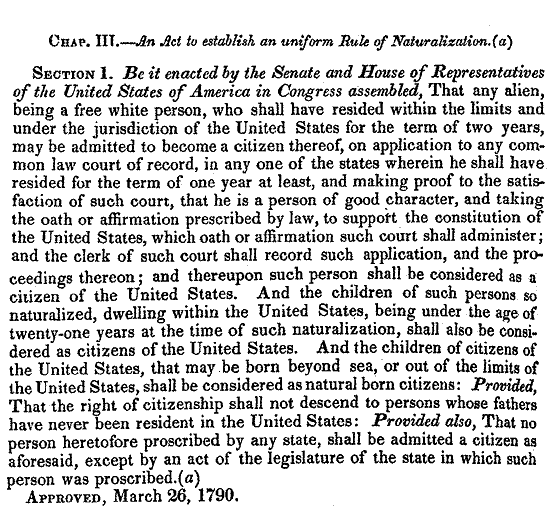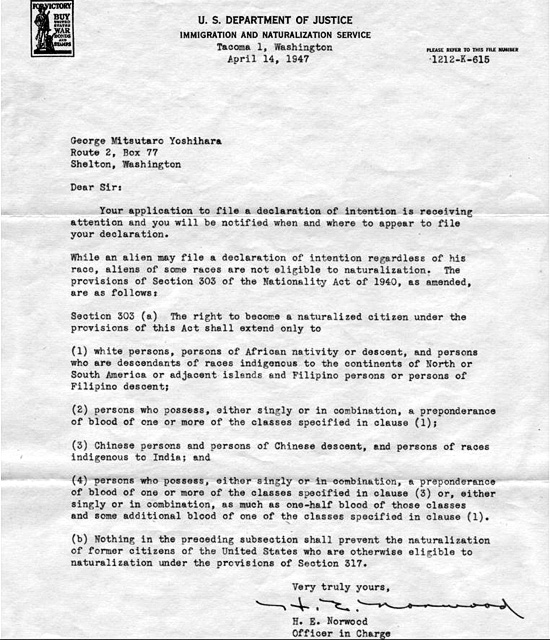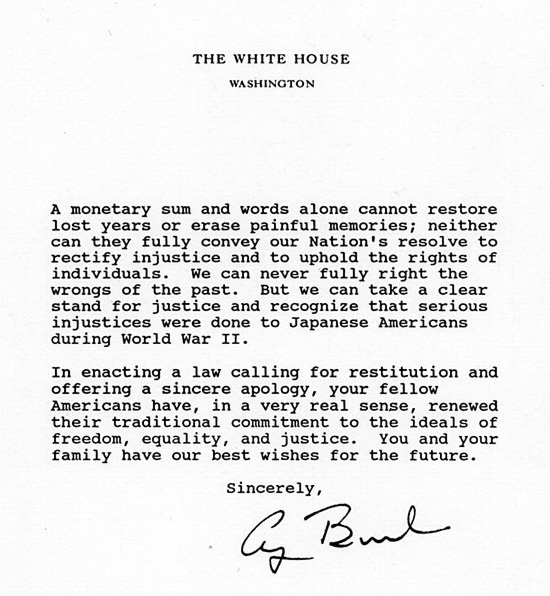Gordon Hirabayashi of Seattle and a U.S. citizen
refused to register to be evacuated from the military zone and then
refused to obey the evacuation order itself. The Supreme Court
considered the case in 1943 and unanimously found the threat outlined by
the Army to have precedence over Hirabayashi's rights as a citizen.
Mr. Chief Justice STONE delivered the opinion of the Court.
Appellant, an American citizen of Japanese
ancestry, was convicted in the district court of violating the Act
of Congress of March 21, 1942 which makes it a misdemeanor knowingly
to disregard restrictions made applicable by a military commander to
persons in a military area prescribed by him as such, all as
authorized by an Executive Order of the President.
The questions for our decision are whether the particular
restriction violated, namely that all persons of Japanese ancestry
residing in such an area be within their place of residence daily
between the hours of 8:00 p.m. and 6:00 a.m., was adopted by the
military commander in the exercise of an unconstitutional delegation
by Congress of its legislative power, and whether the restriction
unconstitutionally discriminated between citizens of Japanese
ancestry and those of other ancestries in violation of the Fifth
Amendment.
The indictment is in two counts. The second charges that appellant,
being a person of Japanese ancestry , had on a specified date,
contrary to a restriction promulgated by the military commander of
the Western Defense Command, Fourth Army, failed to remain in his
place of residence in the designated military area between the hours
of 8:00 o'clock p.m. and 6:00 a.m. The first count charges that
appellant, on May 11 and 12, 1942, had, contrary to a Civilian
Exclusion Order issued by the military commander, failed to report
to the Civil Control Station within the designated area, it
appearing that appellant's required presence there was a preliminary
step to the exclusion from that area of persons of Japanese
ancestry.
...appellant asserted that the indictment should be dismissed
because he was an American citizen who had never been a subject of
and had never borne allegiance to the Empire of Japan, and also
because the Act of March 21, 1942, was an unconstitutional
delegation of Congressional power. On the trial to a jury it
appeared that appellant was born in Seattle in 1918, of Japanese
parents who had come from Japan to the United States, and who had
never afterward returned to Japan; that he was educated in the
Washington public schools and at the time of his arrest was a senior
in the University of Washington; that he had never been in Japan or
had any association with Japanese residing there.
The evidence showed that appellant had failed to report to the Civil
Control Station on May 11 or May 12, 1942, as directed, to register
for evacuation from the military area. He admitted failure to do so,
and stated it had at all times been his belief that he would be
waiving his rights as an American citizen by so doing. The evidence
also showed that for like reason he was away from his place of
residence after 8:00 p.m. on May 9, 1942. The jury returned a
verdict of guilty on both counts and appellant was sentenced to
imprisonment for a term of three months on each, the sentences to
run concurrently.
...
The war power of the national government is 'the power to wage
war successfully'. See Charles Evans Hughes, War Powers Under the
Constitution, 42 A.B.A.Rep. 232, 238. It extends to every matter
and activity so related to war as substantially to affect its
conduct and progress. The power is not restricted to the winning
of victories in the field and the repulse of enemy forces. It
embraces every phase of the national defense, including the
protection of war materials and the members of the armed forces
from injury and from the dangers which attend the rise,
prosecution and progress of war. Since the Constitution commits to
the Executive and to Congress the exercise of the war power in all
the vicissitudes and conditions of warfare, it has necessarily
given them wide scope for the exercise of judgment and discretion
in determining the nature and extent of the threatened injury or
danger and in the selection of the means for resisting it. Where,
as they did here, the conditions call for the exercise of judgment
and discretion and for the choice of means by those branches of
the Government on which the Constitution has placed the
responsibility of warmaking, it is not for any court to sit in
review of the wisdom of their action or substitute it judgment for
theirs.
The actions taken must be appraised in the light of the conditions
with which the President and Congress were confronted in the early
months of 1942, many of which since disclosed, were then
peculiarly within the knowledge of the military authorities....
Although the results of the attack on Pearl Harbor were not fully
disclosed until much later, it was known that the damage was
extensive, and that the Japanese by their successes had gained a
naval superiority over our forces in the Pacific which might
enable them to seize Pearl Harbor, our largest naval base and the
last stronghold of defense lying between Japan and the west coast.
That reasonably prudent men charged with the responsibility of our
national defense had ample ground for concluding that they must
face the danger of invasion, take measures against it, and in
making the choice of measures consider our internal situation,
cannot be doubted.
The challenged orders were defense measures for the avowed purpose
of safeguarding the military area in question, at a time of
threatened air raids and invasion by the Japanese forces, from
the danger of sabotage and espionage. As the curfew was made
applicable to citizens residing in the area only if they were of
Japanese ancestry, our inquiry must be whether in the light of all
the facts and circumstances there was any substantial basis for
the conclusion, in which Congress and the military commander
united, that the curfew as applied was a protective measure
necessary to meet the threat of sabotage and espionage which would
substantially affect the war effort and which might reasonably be
expected to aid a threatened enemy invasion....
When the orders were promulgated there was a vast concentration,
within Military Areas No. 1 and 2, of installations and facilities
for the production of military equipment, especially ships and
airplanes. Important Army and Navy bases were located in
California and Washington. Approximately one-fourth of the total
value of the major aircraft contracts then let by Government
procurement officers were to be performed in the State of
California. California ranked second, and Washington fifth, of all
the states of the Union with respect to the value of shipbuilding
contracts to be performed. 1 In the critical days of March,
1942, the danger to our war production by sabotage and espionage
in this area seems obvious. The German invasion of the Western
European countries had given ample warning to the world of the
menace of the 'fifth column.' Espionage by persons in sympathy
with the Japanese Government had been found to have been
particularly effective in the surprise attack on Pearl Harbor. 2
At a time of threatened Japanese attack upon this country, the
nature of our inhabitants' attachments to the Japanese enemy was
consequently a matter of grave concern. Of the 126, 000 persons of
Japanese descent in the United States, citizens and non- citizens,
approximately 112,000 resided in California, Oregon and Washington
at the time of the adoption of the military regulations. Of these
approximately two-thirds are citizens because born in the United
States. Not only did the great majority of such persons reside
within the Pacific Coast states but they were concentrated in or
near three of the large cities, Seattle, Portland and Los Angeles,
all in Military Area No. 1.
There is support for the view that social, economic and political
conditions which have prevailed since the close of the last
century, when the Japanese began to come to this country in
substantial numbers, have intensified their solidarity and have in
large measure prevented their assimilation as an integral part of
the white population. 4 In addition, large numbers of children of
Japanese parentage are sent to Japanese language schools outside
the regular hours of public schools in the locality. Some of these
schools are generally believed to be sources of Japanese
nationalistic propaganda, cultivating allegiance to Japan. 5
Considerable numbers, estimated to be approximately 10,000, of
American-born children of Japanese parentage have been sent to
Japan for all or a part of their education. 6
Congress and the Executive, including the military commander,
could have attributed special significance, in its bearing on the
loyalties of persons of Japanese descent, to the maintenance by
Japan of its system of dual citizenship. Children born in the
United States of Japanese alien parents, and especially those
children born before December 1, 1924, are under many
circumstances deemed, by Japanese law, to be citizens of Japan. 7
No official census of those whom Japan regards as having thus
retained Japanese citizenship is available, but there is ground
for the belief that the number is large.
The large number of resident alien Japanese, approximately
one-third of all Japanese inhabitants of the country, are of
mature years and occupy positions of influence in Japanese
communities. The association of influential Japanese residents
with Japanese Consulates has been deemed a ready means for the
dissemination of propaganda and for the maintenance of the
influence of the Japanese Government with the Japanese population
in this country.
...
Distinctions between citizens solely because of their ancestry
are by their very nature odious to a free people whose
institutions are founded upon the doctrine of equality. For that
reason, legislative classification or discrimination based on race
alone has often been held to be a denial of equal protection. We
may assume that these considerations would be controlling here
were it not for the fact that the danger of espionage and
sabotage, in time of war and of threatened invasion, calls upon
the military authorities to scrutinize every relevant fact bearing
on the loyalty of populations in the danger areas. Because racial
discriminations are in most circumstances irrelevant and therefore
prohibited, it by no means follows that, in dealing with the
perils of war, Congress and the Executive are wholly precluded
from taking into account those facts and circumstances which are
relevant to measures for our national defense and for the
successful prosecution of the war, and which may in fact place
citizens of one ancestry in a different category from others.
...
Here the aim of Congress and the Executive was the protection
against sabotage of war materials and utilities in areas thought
to be in danger of Japanese invasion and air attack. We have
stated in detail facts and circumstances with respect to the
American citizens of Japanese ancestry residing on the Pacific
Coast which support the judgment of the warwaging branches of the
Government that some restrictive measure was urgent. We cannot say
that these facts and circumstances, considered in the particular
war setting, could afford no ground for differentiating citizens
of Japanese ancestry from other groups in the United States. The
fact alone that attack on our shores was threatened by Japan
rather than another enemy power set these citizens apart from
others who have no particular associations with Japan.



